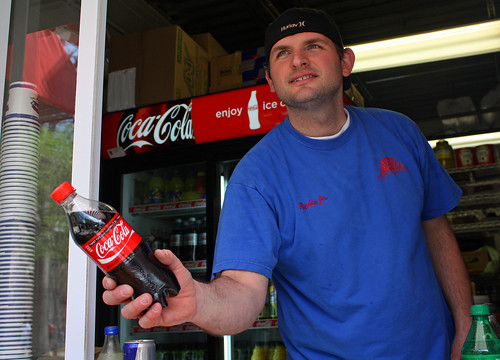A proposed new luxury tax expected to take effect in January 2011 will apply to all non-alcoholic, sugary beverages sold in Philadelphia.
Luxury tax – it applies to diamonds, Aston Martins and now, Coca-Cola.

Early last month, Philadelphia Mayor Michael Nutter made a motion to tax the sale of all non-alcoholic, sugary beverages sold in the city.
According to the bill, known as the “Sugar-Sweetened Beverage Tax,” these beverages include chocolate milk, iced teas, energy drinks, some fruit juices and any others that list a form of sugar, including high fructose corn syrup, as an ingredient.
Nutter plans to tax fountain sodas, pre-packaged bottles and beverages sold at restaurants and vending machines at a rate of 2 cents per ounce. The tax will extend to the syrup used by restaurants to mix soda for fountain drinks, which will be taxed 18 cents per ounce.
Proponents expect the tax to be implemented by January 2011, and by 2016, they say it will rake in about $600 million. Of these revenues, about 75 percent will be allotted to the city’s general fund, and the remainder will fund new citywide programs to encourage a healthy lifestyle, according to a Philly.com report.
Protesters, however, are furious over the potential of rising unemployment due to the tax’s implementation, which they say will reduce demand for soft drinks. With three of the state’s bottling plants for Pepsi and Coca-Cola in the city, an estimated 2,000 jobs could be cut from bottling industry and local businesses.
Nutter’s tax will also be palpable on Main Campus, where countless students, lunch trucks and restaurants – such as Richie’s, a third-generation favorite on Main Campus, located in the Anderson Food Pad – will feel the effects.
Richie Juniors, the owner of Richie’s, said the biggest issue with the soda sales tax is how it affects students.
“Whenever I get billed, charged or anything is raised, I have to pass it on to the consumers,” he said.
“The city is saying it targets obesity, or this or that, but when you break down the dollars, the City of Philadelphia is making more money than I am. I have to raise prices, but I’m not increasing profits. If anything, I lose money,” he added.
The worst part, the vendor said, is that he and his fellow vendors aren’t rallying together and making enough noise against this levy. Big companies like Canada Dry, Pepsi and Snapple have been persistent, and Coca-Cola has plans to leave the city.
But once Coca-Cola leaves, it’s a downward spiral, Richie said.
“If [Coca-Cola manufacturers] move out of the city, they won’t want to deliver to Richie’s,” he said. “Then I have to go to Sam’s or a distributor and pay more than the manufacturer’s price. Then, I have to get a bigger truck and pay more for gas. It never ends.”
He said he fears he’ll have to raise prices at Richie’s, something he said he hasn’t done in two years. But, optimistic and loyal to his customers, Richie said he doubts the bill will pass.
Mayor Nutter and other proponents expect the tax to improve the quality of life in Philadelphia and eliminate previously proposed service cuts.
Philadelphia County ranks least healthy in Pennsylvania, and more than half of the city’s youth are reportedly overweight. Proponents behind the initiative hope the tax will combat and prevent the spread of obesity.
But President of Temple College Democrats Daniel Dunphy said he isn’t so sure.
“All this unknown is coming from the government,” Dunphy said. “This uncertainty trickles down to students. It’s not fair.”
President of College Republicans Barry Scatton, a senior political science major, said he highly disapproves of the levy as well.
“I see a tax of this nature of simply being a little tiny Band-Aid covering a gaping wound,” Scatton said. “And a temporary fix is not what we need right now. We need long-term solutions to fix this problem. We can’t keep pumping money into an inefficient bureaucracy.”
Scatton said he has faith the student body will continue to consume soda, despite the price hike.
“Coca-Cola, for example, is a long-standing American institution, a symbol of American capitalism and is associated with having a good time and feeling good. Students are going to keep drinking it. They’ll just pay more,” Scatton said.
Dunphy said Temple students are easy targets for Nutter’s tax.
“[City government] knows we can’t vote against it,” Dunphy said. “They close our dorms a week before elections, and there’s no way our voices can be heard.”
As for how the tax affects the university, Dunphy said meal plan prices would likely increase. And while he’s not entirely against the tax, he said he believes Nutter is trying to find the best solution but isn’t quite there yet.
Another problem Dunphy cited is the way neighborhoods surrounding Main Campus will feel the effects. Since small businesses are the crux of the community, he said, when their revenues are affected, the area will become blighted.
“There is a lot of money coming into North Philadelphia, like the Fresh Grocer, but we have to make sure these businesses are sustainable once they owe the government a greater fee every year,” he said. “We don’t want to bring the upswing here back down.”
Alexis Sachdev can be reached at asachdev@temple.edu.



Be the first to comment